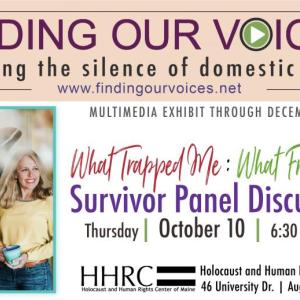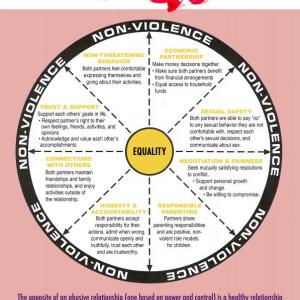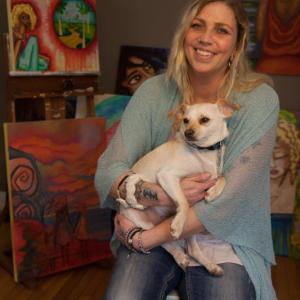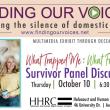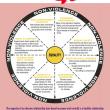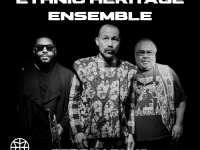Patrisha McLean propels ‘Finding Our Voices’ to next phase of movement against abuse
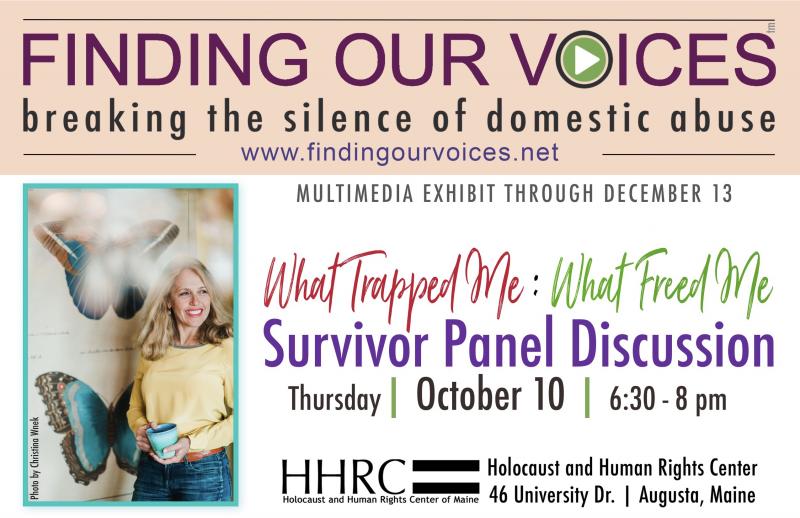
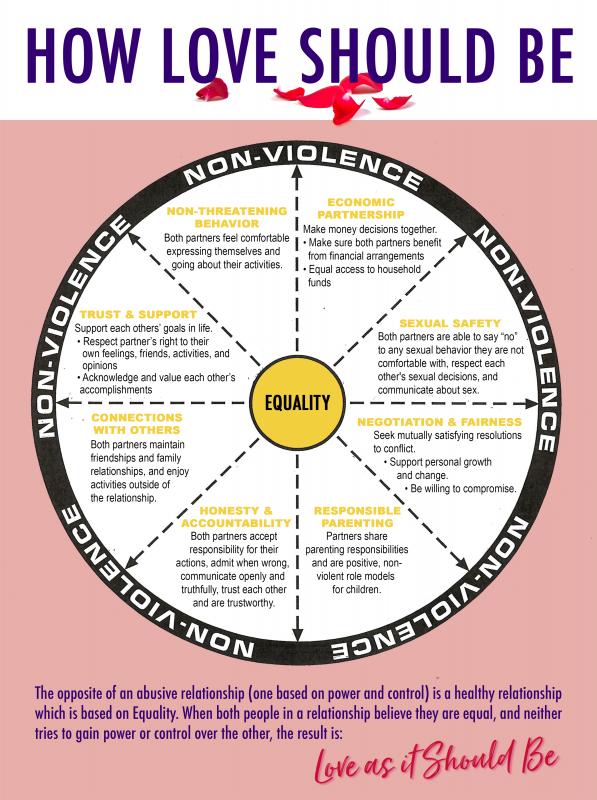
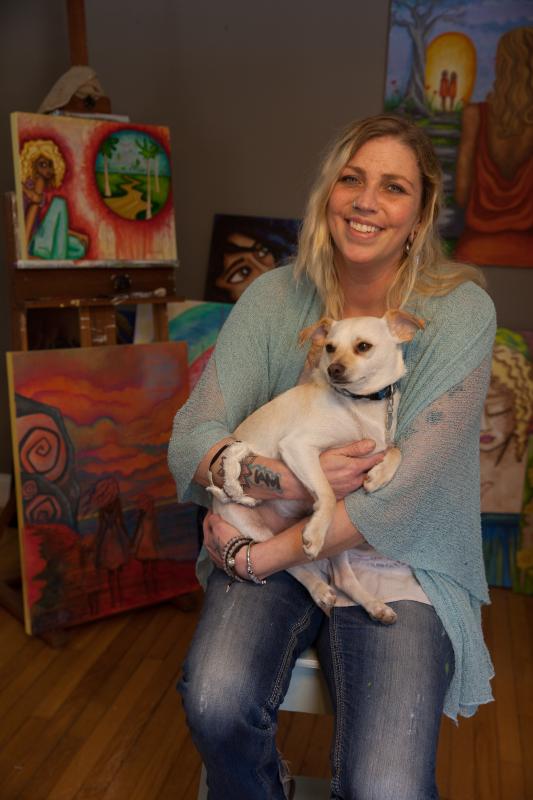 "Freedom" by Maegan Graslie. Maegan, and her painting (see below), are part of the Finding Our Voices: Breaking the Silence of Domestic Abuse exhibit at the Holocaust and Human Rights Center through December 13. Maegan, studying to be an art therapist at the University of Maine, said: "I can finally be myself. I haven't been myself for 11 years of my life." (Photo courtesy Patrisha McLean)
"Freedom" by Maegan Graslie. Maegan, and her painting (see below), are part of the Finding Our Voices: Breaking the Silence of Domestic Abuse exhibit at the Holocaust and Human Rights Center through December 13. Maegan, studying to be an art therapist at the University of Maine, said: "I can finally be myself. I haven't been myself for 11 years of my life." (Photo courtesy Patrisha McLean) 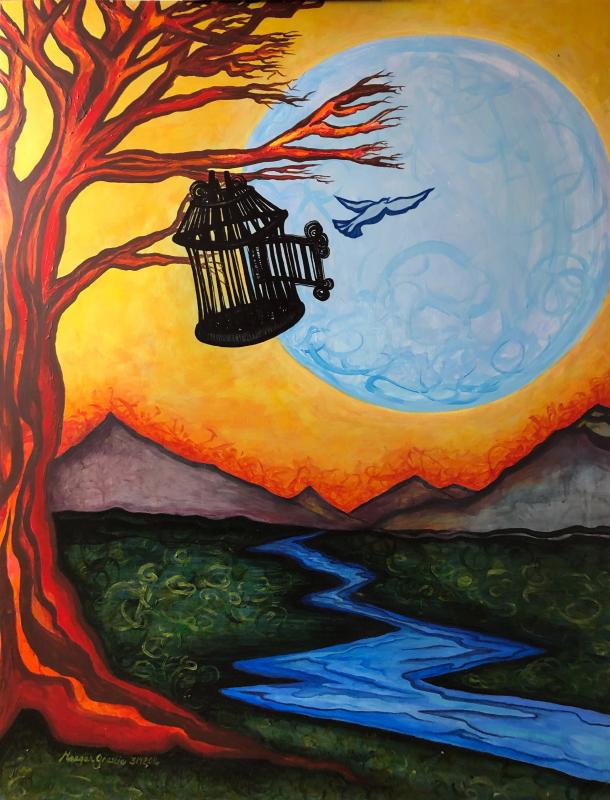 "Freedom" by Maegan Graslie. (Image courtesy Patrisha McLean)
"Freedom" by Maegan Graslie. (Image courtesy Patrisha McLean)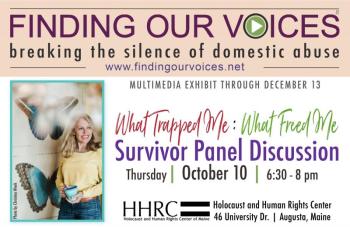
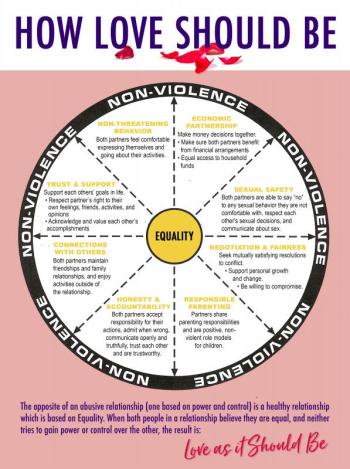
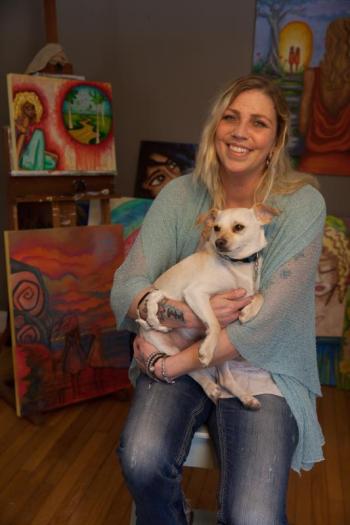 "Freedom" by Maegan Graslie. Maegan, and her painting (see below), are part of the Finding Our Voices: Breaking the Silence of Domestic Abuse exhibit at the Holocaust and Human Rights Center through December 13. Maegan, studying to be an art therapist at the University of Maine, said: "I can finally be myself. I haven't been myself for 11 years of my life." (Photo courtesy Patrisha McLean)
"Freedom" by Maegan Graslie. Maegan, and her painting (see below), are part of the Finding Our Voices: Breaking the Silence of Domestic Abuse exhibit at the Holocaust and Human Rights Center through December 13. Maegan, studying to be an art therapist at the University of Maine, said: "I can finally be myself. I haven't been myself for 11 years of my life." (Photo courtesy Patrisha McLean) 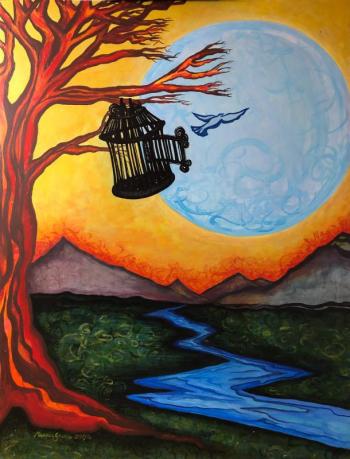 "Freedom" by Maegan Graslie. (Image courtesy Patrisha McLean)
"Freedom" by Maegan Graslie. (Image courtesy Patrisha McLean)CAMDEN — Since mounting her first exhibit last winter of Finding Our Voices, photographer and Camden resident Patrisha McLean has been on the road with the multi-media photography show that illuminates Maine’s domestic abuse scourge. On Oct. 10, she will host a panel discussion, “What Trapped Me, What Freed Me,” at the Holocaust and Human Rights Center, in Augusta.
And then, she said, it’s on to the next phase, which will premiere in 2020, “in a different way.”
McLean’s “Finding Our Voices, Breaking the Silence of Domestic Abuse” exhibit comprises voices and photo portraits of 19 women who range in age from their 20s to 79. Visitors to the exhibit listen via cell phone to the individual women sharing their personal journeys of entrapment into, and journey out of, abuse by a person they loved, and who purported to love them.
The stories are raw and forthright, and resonate across all income brackets and age groups.
Five survivors of domestic abuse will share their stories during a “What Trapped Me: What Freed Me” evening in Augusta, on Thursday, October 10, from 6:30 to 8 p.m at the Holocaust and Human Rights Center of Maine.
The survivor panel discussion, is part of McLean’s “Finding Our Voices” exhibit, which is on display at the HHRC through December 13.
Since her first show, in February 2019 at the Camden Public Library, McLean has taken her work to Castine, to the Goody B. Art Gallery, as well as to the community centers on North Haven and Islesboro. She spoke before the Camden Rotary Club, Watershed School and the Landing Place, and convened two six-session book club meetings at the Women’s Reentry Center at the Maine Correctional Center in Windham.
McLean has learned over the past eight months that, “domestic violence is more pervasive than I thought.”
She also has found that a sense of shame often afflicts the victim.
Why Does He Do That: Inside the Minds of Angry and Controlling Men, by Lundy Bancroft, is a book that McLean cites often in conversation. The book is straightforward and the author clear in stating that abusers, no matter how they manifest their emotional and physical violence, must be responsible for their actions.
The shame is always on the victim, and the perpetrator gets away with it, said McLean.
“Encourage the women in your life—your friends, sisters, mothers, daughters—to insist on dignity and respect, to have faith in themselves, to be proud,” wrote Bancroft, who spent 15 years counseling abusers. “Expect boys and men to be respectful, kind, and responsible, and don’t settle for less.”
That is, in part, McLean’s next iteration of her project, Finding Our Voices.
When asked what makes a healthy relationship, she replies that she and a friend have just finished a wheel entitled “How Love Should Be.” (See graphic)
It is a graphic representation of the opposite of an abusive relationship, “one based on power and control,” they wrote. “When both people in a relationship believe that they are equal, and neither tries to gain power or control over the other, the result is Love is How it Should Be.”
McLean looks forward to October 2020 and Portland, where she will again exhibit. Assisted this winter with a $4,000 Deborah Pulliam grant, she intends to strengthen and expand her portraits, from 19 to 30.
She won’t divulge too much about the next phase, but said it will be, “similarly related but different.”
But more so, McLean believes that Finding Our Voices is: “a movement. It’s not just an exhibit. The exhibit is part of the movement.”
She will continue to provide a platform for women to tell their stores, “and they more stores, the stronger the message that ‘you’re not alone,’” she said. “There should be no shame. That’s what keeps people silent. More and more, that is the key, to give voice.”
October is Domestic Violence Awareness Month, and the “What Trapped Me: What Freed Me” evening is part of a larger initiative to highlight domestic violence as a human rights issue. The exhibit and event are cosponsored by the HHRC and the Maine Coalition to End Domestic Violence.
The panel discussion will be at the Holocaust and Human Rights Center of Maine on the University of Maine at Augusta campus at 46 University Drive in Augusta. For more information, go on the website hhrcmaine.org or indingourvoices.net
Event Date
Address
United States

